#and his maternal grandparents living in poland during the war
Explore tagged Tumblr posts
Text
Will someone please tell me how I started out at 11 intending to get a large chunk of a fanfic written, and now at 3:40 I have ended up researching Poland during WW2?
#if you really want the answer#it's me researching Richie’s heritage#what his grandparents lives would’ve been like#and how this influenced him#such as his paternal grandparents living through holodomor#and his maternal grandparents living in poland during the war#obviously this affects their kids (Richie’s parents)#which affects him#and in this case#his relationship with food#i want to do it justice#and also get more of an idea of what would've pushed him to develop an ed#richie jerimovich#the bear
4 notes
·
View notes
Text
WWII timeline & harry potter
saw some ppl arguing about if tom riddle was in the blitz/how affected he was by WWII
dec. 31, 1926: tom riddle is born
1926- 1937: riddle is raised in london orphanage (during this time he: kills and hangs a girl’s rabbit from the rafters, traumatizes two kids in a cave, and steals things)
c. 1938 (after dec. 31, 1937): dumbledore visits an 11 year old riddle to tell him about hogwarts
sept. 1938- june 1939: riddle’s 1st yr
sept. 1939- june 1940: riddle’s 2nd yr
sep. 1939: hitler invades poland and the uk declares war
jan. 1940- food rationing begins (clothing in june of 1941)
june 20, 1940: first nazi air operations begin flying over britain
1940-1945: towns on the south coast of england are targeted in “tip and run raids”
sep. 7, 1940- may 11, 1941- london blitz
sept. 1940- june 1941: riddle’s 3rd yr
sep. 1941- june 1942: riddle’s 4th yr
sep. 1942- june 1943: riddle’s 5th yr where he opens the chamber of secrets, kill myrtle (around june 13), and get hagrid expelled
1942: historic london cities (ex. york, canterbury, exeter) are bombed
aug. 1943: riddle kills his father, paternal grandparents, and frames his maternal uncle
sep. 1943- june 1944: riddle’s 6th yr where he at some point creates his first horcrux
jan. 22, 1944: second mini blitz
sep. 1944- june 1945: riddle’s 7th yr
mar. 17, 1945: final bomb dropped over hull
so riddle is at hogwarts when england declares war. he doesn’t directly experience the blitz as it ends a little over a month before hogwart’s term is done. he definitely sees the aftermath of the blitz and maybe spends the summer or part of the summer of 1941 in the countryside (if the orphanage evacuated for the blitz). he would have experienced the build up to the blitz as fears/rumors of bombings or poisonous gas attacks began in london as early as 1939. he was also at hogwarts for the second mini blitz in 1944 and the war ends before he graduates from hogwarts. idk where little hangleton is but he could experienced “tip and run aids” if hangleton’s on the coast and happened to be bombed while he was there. he did experience and deal with war rationing. but it doesn’t look like he would have directly lived through the london blitz or likely any of the smaller air campaigns.
you can however side eye dippet for telling tom in 1943 that he can’t stay at hogwarts over the summer and would be safer in london (a city that experienced horrific bombing less than two years ago, would experience a second bombing in less than a year, and continued to be a potential target for the rest of the war)
and everyone likes to talk about his trauma from the war as almost a mitigating circumstance for his behavior but so many ppl lived through the blitz and didn’t become neo nazis or blood purists.
#harry potter#I don’t get the impression riddle even cared about the war#he probably wrote it off as muggle problems and beneath him#and he probably thought his “special” and “superior” magic abilities would save him from any muggle warfare#I don’t think wizards seemed too concerned with wwii? or even the nuclear age#like rip voldemort but you will never cause the destruction mr “now i am become death destroyer of worlds” did#does the wizarding world know muggles have weapons capable of blowing up the entire planet? and that ppl kept threatening to use them#for like 30 years post wwii like do they know about the cuban missile crisis? they should
0 notes
Note
I was going to wait for my mom to give me the names of the shtetls, but everything is crazy with my IV meds for Crohn’s (Ashkenazi genes for the lose) and moving and so…
My mother’s maternal family is from Bessarabia. Most of them left, on the same passport that they kept mailing back, to New York in the 1910’s. Some came through Uruguay, like my great grandfather who was a gaucho and furniture salesman down there for many years. My grandmother was born in Queens and was the first female graduating class of Queens College. She worked in a canteen during the war and was advised to change her last name so as not to appear Jewish. Her brother served in Britain and survived a Blitz bombing outdoors. (The irony is this name was changed names they came to America!)
Her paternal family came from Southern Poland in the 1910’s as well. Not all came over and actually one of the towns they were from was Oświęcim which became Auschwitz. I only had two cousins from those who stayed who survived. Nearly all were murdered in Auschwitz. One cousin survived the camp. The other cousin hid with her two small sons in a church basement where she was required to do all their menial tasks in exchange for being hidden. One day, a nun told her the war was over. She didn’t believe it and went outside to see for herself. She hadn’t been in daylight for years and fainted. When she came to, her two sons were in a cattle cart. She never saw then again.
Interestingly enough, only one surname is Cyrillic in my maternal family. The rest are Germanic. My grandfather was born in Manhattan and his surname is shared with a prominent Nazi. Very uncomfortable. My grandfather served in WWII in Hawaii.
Unfortunately, I know extremely little about my dad’s family. His father’s family was from Warsaw and owned a hardware store and considered themselves fairly well-to-do. In the 1890’s, my dad’s paternal grandfather visited the city (NY) to consider moving there. He was appalled by the tenements and filth and couldn’t understand why anyone would leave their homeland. If he only knew. My grandfather was an electrical engineer in Warsaw.
My grandmother’s family was from a very small shtetl outside of Warsaw. She moved to Warsaw to work as a milliner. She had a very unusual surname and I’ve been unable to find anyone alive with it with whom I’m related.
My grandparents left Warsaw when the Germans invaded and made it to the Russian border. The guards were refusing to allow anyone in so there was a camp of refugees. One night, the guard opened the gate and turned his back. My grandparents got married at some point during this, probably by a minyan, and probably not legally binding, but any talk of this upsets my dad so I don’t know more.
They were deported to Siberia and put in a prison camp. My grandmother died of breast cancer before I was born (more of those great Ashkenazi genes) and my grandfather wouldn’t talk about it so all I know is that they considered themselves very lucky to have been ‘saved’ by the Soviets and ‘only’ imprisoned in a gulag. (I learned about intergenerational trauma relating this to my therapist ten years ago.) My grandfather parlayed his knowledge of electronics to serve as an electrician instead of mining coal. (He had to work on live wires with no gloves.) My grandmother was given wool to knit for the guards and their wives and received bread in return. Mt grandparents had a son there who died of measles and malnutrition at the age of two.
Shortly before the war ended, they were moved to Tashkent. Then the Soviets tried to force my grandfather into the army. The Americans were in Germany at this point. I have no idea how, but my grandparents made it to Germany and were put in Schwäbisch Hall Displaced Persons Camp. My dad was born there in 1947.
In 1949, they emigrated to New York. They had another son six years later.
Two things of interest: We did all the DNA sites and my parents are very distant cousins which is apparently common among Ashkenazi because of endogamy. Also, both my parents speak Yiddish. It’s my dad’s first language. However, my mother grew up with ‘southern’ Yiddish and my father ‘northern’ Yiddish.
We survived!
Thank you so so much for sharing this! This was a very interesting and emotional read for me, as I personally can relate to a lot of things in your text. Ashkenazi genes can be a burden in a lot of different ways, but, most importantly, they, we, our ancestors and their stories survived. I wish you all the best and wish I could talk with you sometime.
9 notes
·
View notes
Text
Józef Poniatowski’s family album.
Part II. Grandparents, uncles, cousins (or 3 Stanisławs, 2 Konstncjas, Kazimierz and Michał )))
This week let’s continue talking about prince Józef relatives. In the previous post on the topic I wrote (and showed portraits) of Pepi’s parents and sister. So today there will be images and some information about others.
Let’s start with the grandparents. (Unfortunately, I wasn’t able to find much about Poniatowski’s maternal ancestors, so this post will be about relatives from his father's side...)
This fancy gentleman is the father of prince Anrdzej and the progenitor of the family - Stanisław Poniatowski.
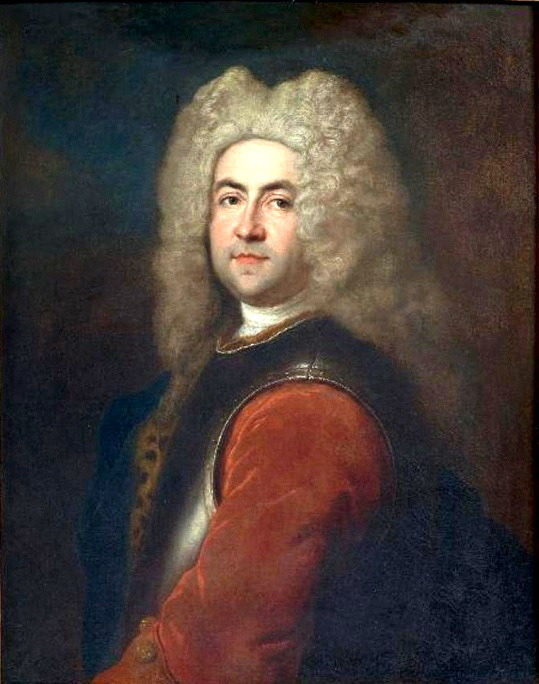
Portrait of Stanisław Poniatowski, unknown painter, 18th century
He was born in 1676, as a son of a petty nobleman from Lesser Poland. And died in 1762, having achieved the highest rank possible for a civil servants in the Polish-Lithuanian commonwealth - the castellan of Kraków. (Speaking in modern terms Stanisław Poniatowski can be called a self-made man.)
Of course, the life of such a man was full of ups and downs. That is why telling you about him I would like to focus only on things, which IMHO had some similarities with the destiny of Stanisłasw’s grandson, prince Józef.
During the Great Northern War Stanisław took the side of the Swedish king Charles XII and the latter’s protégé - as a king of Poland - Stanisław Leszczyński. (On the other side there were Peter The First of Russia and August II of Saxony, who had been elected as a Polish king.)
To the misfortune of the first party, one of the decisive battles of that war, the one Poltava in 1709, was lost, but this wasn’t a reason for Poniatowski to turn his back on Charles. On the contrary, Stanisław then saved life of his suzerain, and after that help him to flee to Turkey. And remained faithful the Swedidh king to the very end, till Charles’ death 10 years later. (Although for this reason Stanisław had to spend all these years abroad, taking care of various matters of the latter.)
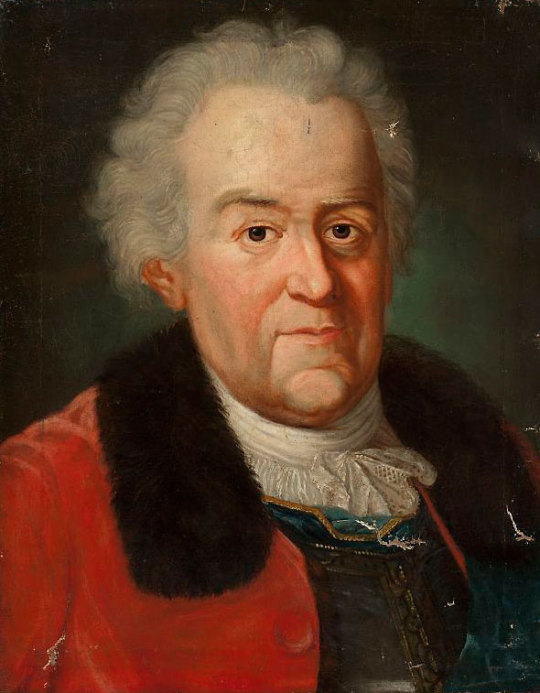
Marcello Bacciarelli, Portrait of Stanisław Poniatowski, after 1758, National Museum in Warsaw
And only after Charles passing away, Poniatowski went to Poland and asked pardon from August II. And having received it, remaining a faithful servant of that ruler till the Saxon king’s death in 1732.
During the next interregnum, however, Stanisław supported again the candidacy of Stanisław Leszczyński, the former protégé of Charles II. And only under the pressure of circumstances (one of his youngest sons, his namesake Stanisław, the future last king of Poland, was kidnapped by the adversaries of the opposite, Saxon party, to forced Poniatowski to join them) he switched sides.
As for Stanisław’s private life - it was also not without complications. In 1710 he married Teresa Jasieniecka, a widow of a Lithuanian nobleman Ogiński. But shortly the wedding it turned out that Teresa’s financial state was not so well as expected, instead of money she possessed debts only. And it looks like it was the reason for Poniatowski to leave her. (Some sources even say that the couple eventually divorced).
Anyway, whatever happened with Teresa later, in 1720 Stanisław seemed to be eligible again, because that very year he married again, this time to Konstancja Czartoryska.
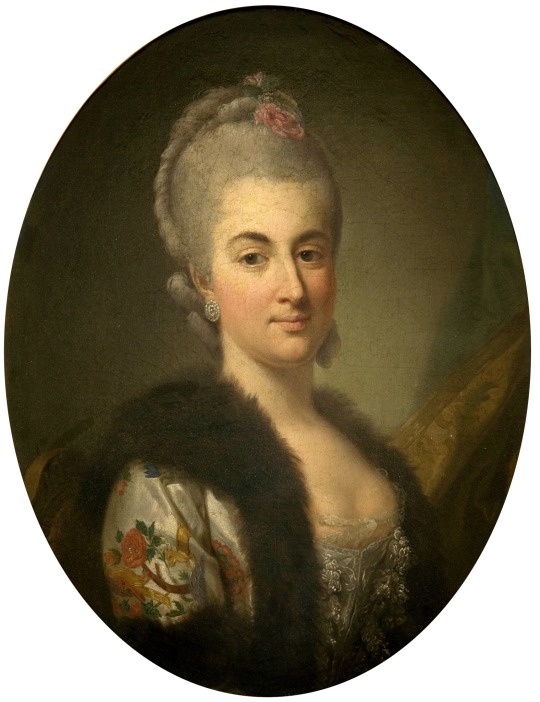
Per Krafft the Elder: Portrait of Konstancja Czartoryska, circa 1768, National Museum Kraków
Being born circa 1700 Konstancja was about 20-25 years younger than Stanisław’s, but this didn’t prevent the the marriage from being successful. The reason might have been that, though for Poniatowski this was again a kinda “strategic marriage” (because the Czartoryski family was very powerful), the bride was really in love with her groom. To such an extent that she married him despite her father’s will.
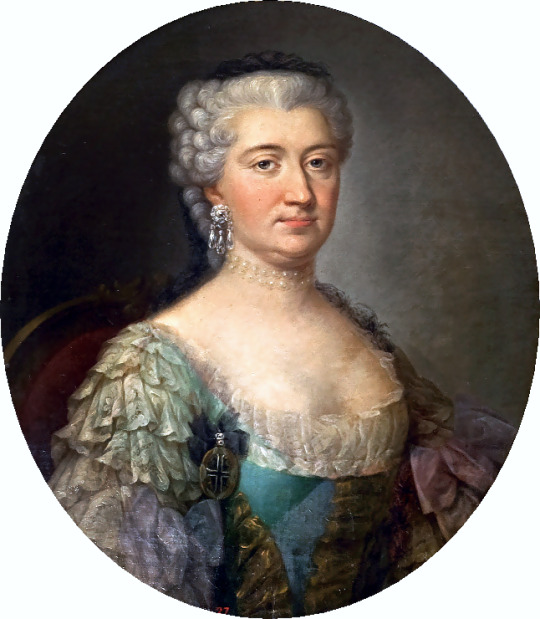
Marcello Bacciarelli, Portrait of Konstancja Czartoryska, 18th century
And, in general, Konstancja was so stubborn and willful, that in the family she was called “Chmura gradowa” (hail cloud).
As an example of her adherence to principles there might be recalled the story of her son Kazimierz duel with Adam Tarło. First she forced Kazimierz to challenge Tarło - though even by the standards of that time the reason doesn’t seem justified enough. An then, when the shooting happened with no harm to both sides and young men reconciled, the mother made the son to challenge his former adversary twice. And that time the duel ended with a death, fortunately to her - not of her son.
And such a story was not a unique one. (And something prompts me that had Konstancja been alive in 1761, when her son Andrzej, prince Józef’s future father, was about to marry a Czech noblewoman Teresa Kinska, the princess Poniatowska might not have agreed to that union. But the latter died already in 1758, so it wasn’t hard for Andrzej to get agreement from his very old and ailing father...)
Now, let us move to the next generation of Poniatowskis. The most known of them (and who, btw, was the favorite son of his mother) is Stanisław Antoni. Because in 1763 he was elected to become the king of the Polish-Lithuanian commonwealth (and, ascending the throne, changed his second name to “August”).
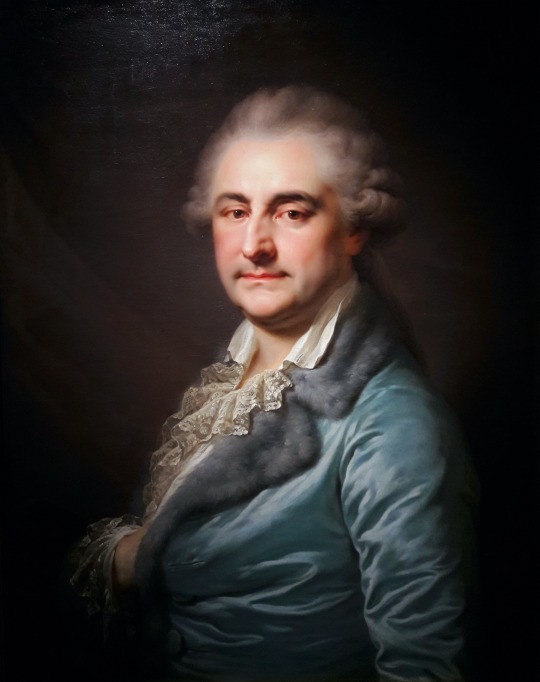
Johann Baptist von Lampi the Elder: Portrait of Stanislaus Augustus in a dressing-gown, between 1788 and 1789, National Museum in Warsaw
Do you remember that the second name of prince Józef was “Antoni”? Yes, he got it in honor of that uncle of his!
And later Stanisław August had a lot of influence on his nephew, taking care on young Pepi and his older sister Teresa after their father’s death in 1773.
But in my opinion it won’t be correct to call prince Józef the favorite of king Stanisław, the person whom the latter saw as his possible successor on the Polish throne. Why? Because there also was the oldest of Stanisław’s siblings children, the son of the above mentioned Kazimierz and the king’s namesake - one more Stanisław. (More about him - a little bit below.) And only for the short period from 1791, when that Stanisław withdrew from public life and emigrated to Italy, till 1795 Pepi’s candidature might have seriously been seemed as a possible royal successor.
Ok, now let’s look at Kazimierz. In addition to participating in that infamous duel the oldest of survived sons of the Poniatowskis was known for leading a rather riotous life. Having married a wealthy bride Apolonia Ustrzycka he had a lot of money and spent them freely and sometimes rather eccentrically. In his greenhouses, for example, there were grown... pineapples! And he also brought to Poland from Africa a bunch of monkeys (though all they died shortly because of the cold Polish climate (( )
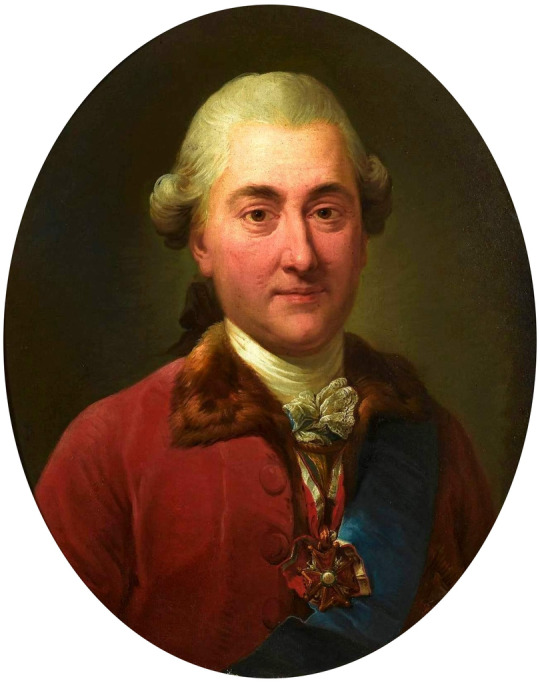
Unidentified painter, Portrait of Kazimierz Poniatowski, second half of 18th century, Palace Museum in Wilanów
In his private life prince Kazimierz was also a real child of his time - he had several mistresses. And one of them he even drove around Warsaw naked - so that everyone could "see" her charms. (You see, prince Józef had people among his uncles to take examples from ))) And I must also mention, that Kazimierz had a loving affection for his nephew. And in the last decade of the 18th century, when Pepi was already living in Warsaw, the uncle willingly invited the nephew to his place and even supported him financially.
And despite that notorious style of life prince Kazimierz outlived all his younger brothers and died in 1800, being almost 80 years old.
And now a little bit information about Michał, the youngest of prince Józef uncles. He was destined by his parents for the clergy, and in the church hierarchy he “climbed” to the highest Polish rank - the Primate of Poland. (Though, as many sources state, prince Michal was a priest just in the spirit of his age - having mistresses and possible even illegitimate children.)
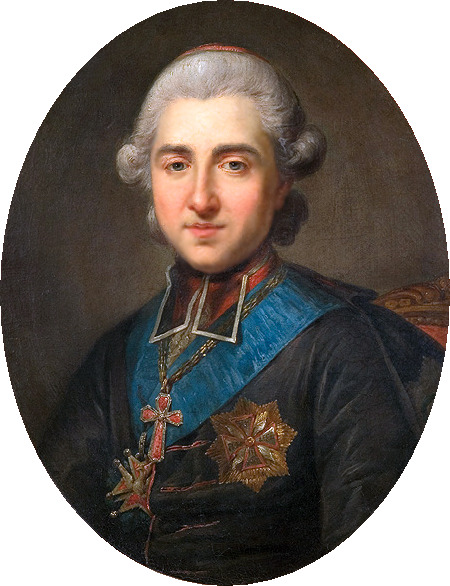
Marcello Bacciarelli, Portret of Michał Jerzy Poniatowski, National Museum in Poznań, 18th century
And the circumstances of his death in 1794, in the age of 57 years only, still aren’t clear enough. That was the time, as you may remember, of Kościuszko’s Uprising, and Michał was among supporters of the king and the latter’s pro-Russian politics. So, when the primate became seriosly ill and then died there appeared rumors, that that might have been a suicide, in fear for being hanged, as those members of Targowica Confederation who weren’t lucky to flee.
In relation with prince Józef I can name only one significant thing of Michał’s biography - it was who from him Pepi inherited Jabłonna village under Warsaw with its famous palace.
For the record I should also mention that the Poniatowskis-senior had also 2 daughters, Ludwika Maria and Izabela, but they didn’t seem to play significant roles in their nephew’s life.
And now let’s look at the third generation - Pepi’s cousins, children of prince Kazimierz.
This is the very prince Stanisław, whom I mentioned above:
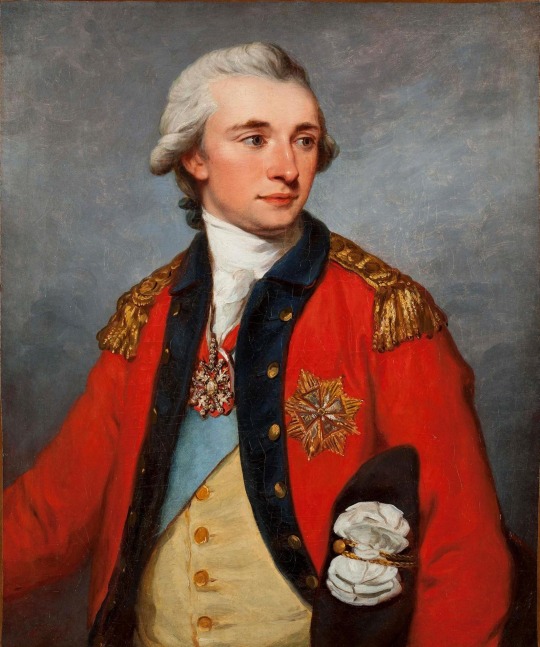
Angelica Kauffman, Portrait of Stanisław Poniatowski (1754-1833), 1786
Very well educated and economically talented, he carried out a lot of reforms in his vast estates in Ukraine, and made these land prosper. Being interested in art, he founded a painting school in Warsaw. More than once a member of the Sejm, elected marshal of the knighthood of the Permanent Council, member of the confederation of the Four-Year Sejm and... not a popular figure among the the nobility (szlachta).
Because of the latter reason in 1790 there arose a conflict between prince Stanisław and his adversaries, after which the prince resigned from all his post and abroad.
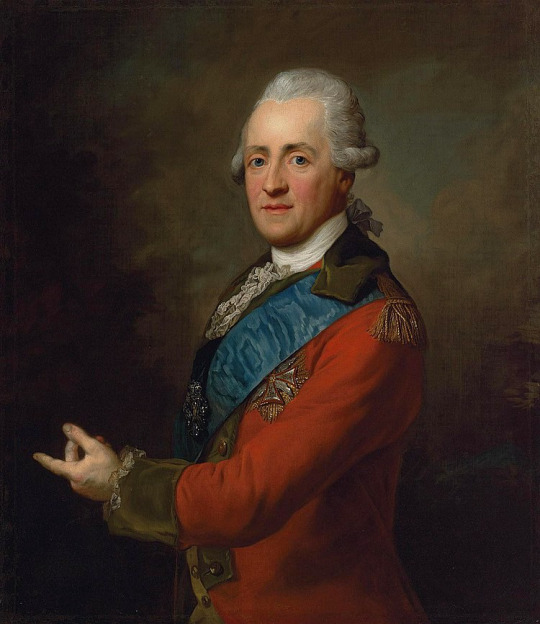
Portrait of Stanisław Poniatowski (1754–1833), attributed to Johann Baptist von Lampi the Elder, 18th century
He settled in Italy, where he owned estates, and unlike his cousin Józef, never returned to public life.
As for Stanisław’s private life - well, it also looked like a suitable plot for a romance novel. The prince met his future wife in Rome, when he was already in his fifties. She was thirty years younger than him and... a wife of his neighbor.
Her name was Cassandra Luci, and she was a common woman, beaten by her cruel husband. And one day, trying escape from an attack, she knocked on prince Poniatowski’s door, was allowed to enter his residence, and stayed with the latter forever.
First, of course, Cassandra served in Stanisław’s residence just as servant, becoming the housekeeper. But soon she answered his feelings, and... by 1816 the couple had already 5 children - 2 sons and 3 daughters. And when in 1830 Cassandra’s husband died, Stanisław was finally able to marry her.
And all the Poniatowskis living now in France are descendants of this couple. Or, to be more precise, of their second son Joseph Michael.
Relating to prince Józef - it looks like his cousin Stanisław didn’t have much affection on him. They met a couple of times before Pepi moved to Warsaw in 1788, definitely had chances to see each other between that time and the year when Stanisław emigrated, but that’s all. And much more close prince Józef was with his other “probably” cousins - the sons of king’s mistress, Elżbieta Grabowska. (But this definitely goes out the topic of this post.)
So, let’s move to the last person of today’s article, prince Stanisław’s younger sister princess Konstancja.
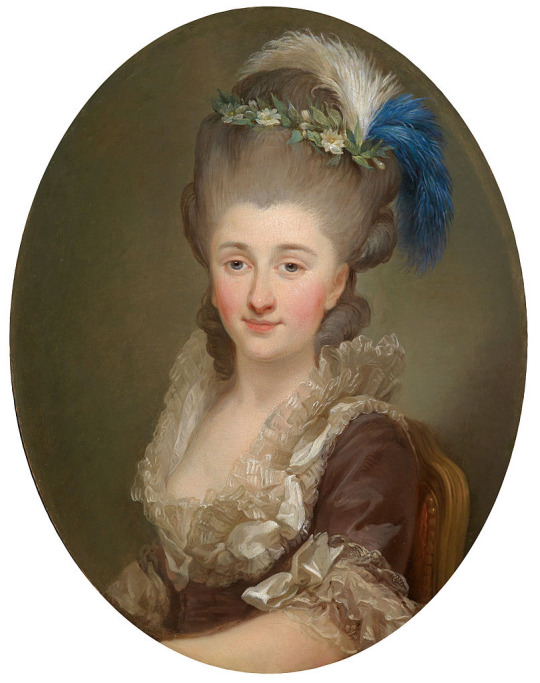
Marcello Bacciarelli, Portrait of Konstancja Tyszkiewicz, nee princess Poniatowska, circa 1775
And, I have to admit, she didn’t play any significant role in Pepi’s life either. (Though her daughter, Anetka, might have had - but about the latter I will write later, when the time comes to publish next post of prince Józef women.) But the reason I am writing about this Konstancja now is that her husband’s surname was Tyszkiewicz, just like the surname of the Pepi’s sister Teresa’s husband.
If you ask me whether those two Tyszkiewiczs were relative, I would answer you that they were very distant ones, because last common ancestor was the progenitor of the Tyszkiewicz family, named Tyszka, who lived in the 15th century.
As for why the king decided to marry both his nieces to the Tyszkiewicz family - on this question I don’t either have an answer. But I can quote you a verse which was written in Poland that time:
Tyszkiewicza
Król policzą
Między bliskich swoje
Dał jednemu
Dał drugiemu
Swych synowic dwoje
(Translation: The king counts the Tyszkiewiczs among his relatives, he gave to one of them and to another two of his nieces)
And because of these two Tyszkiewiczs, and the fact that Anetka Potocka née Tyszkiewicz is sometimes called prince Józef’s niece (though in fact they were first cousins once removed) Teresa Poniatowska, Pepi’s sister is, in these cases, called her mother, which is not at all true. And eery time I write such a statement it that makes me cringe. That is why I felt I ought to write about Konstancja, for the people know that there was one more Mrs. Tyszkiewicz, and that she was Anetka’s real mother.
Well, that’s all for today. and I hope I didn’t make you much tires with untangling all these family ties? ))
#józef poniatowski#the poniatowskis#poniatowski#stanisław poniatowski#stanisław august poniatowski#polish history#konstancja poniatowska#kazimierz poniatowski#michał poniatowski
6 notes
·
View notes